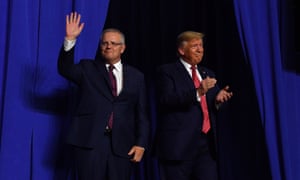UN climate summit focus is on net zero by 2050 but Australian PM says challenge ‘not just about climate change’
Scott Morrison has ducked questions about when his government will
develop an emissions reduction strategy for 2050, despite signing on at
the Pacific Islands Forum to a communique pledging to develop one next year.
The Australian prime minister is also copping flak at home for his decision to signal in a speech in Chicago that China needed to be treated like a developed economy both in global trade and climate change negotiations – meaning Beijing would need to make a significant commitment towards emissions reduction.
With the United Nations Climate Action Summit under way in New York, where the focus is on strategies for achieving zero net emissions by 2050, Morrison on Monday side-stepped when his government might deliver policies to achieve that goal.
“I’m committed to what I took to the Australian people and that was
26% [emissions reduction] by 2030,” the prime minister said. “That’s
what we’ll achieve, that’s what I promised we’d do, that’s what I told
the Australian people we would do.”The Australian prime minister is also copping flak at home for his decision to signal in a speech in Chicago that China needed to be treated like a developed economy both in global trade and climate change negotiations – meaning Beijing would need to make a significant commitment towards emissions reduction.
With the United Nations Climate Action Summit under way in New York, where the focus is on strategies for achieving zero net emissions by 2050, Morrison on Monday side-stepped when his government might deliver policies to achieve that goal.
Asked what the plan beyond 2030 was, Morrison said: “We are making our commitments to 2030, that’s what we are doing. We keep setting the targets and we keep meeting them.”
When it was pointed out to him that Australia had agreed at the Pacific Islands Forum to develop a 2050 strategy in 2020, Morrison hedged: “We said we’d look at that as part of the communique.”
The PIF communique says all parties to the Paris agreement would “formulate and communicate mid-century long-term low greenhouse gas emissions development strategies by 2020”.
“This may include commitments and strategies to achieve net zero carbon by 2050,” it said. Australia signed after conflict with Pacific nations over the lack of ambition on climate policies and an argument over coal.
Morrison decided not to attend the UN climate summit, deploying his foreign minister, Marise Payne, instead. The US president, Donald Trump, was also expected to snub the event but stopped by at the last minute, telling reporters he was interested in clean air and clean water.
In his foreign policy speech in Chicago, Morrison signalled he wanted to redraw the conventions of global climate negotiations by treating China as a “newly developed” economy rather than a developing one – a landmark shift that would require China to reduce greenhouse gas emissions like the developed world.
Australia wants to rally support among other nations for this putative shift. But ahead of the New York summit, China flatly rejected Morrison’s argument that it needed to do more to reduce emissions, pointing to the longstanding principle within the United Nations Framework Convention on Climate Change of “common but differentiated responsibilities”.
China also signalled that it wanted ongoing support from developed countries to help it manage the transition. “In particular, the developed countries should implement and strengthen their commitments to providing financial and technological assistance to developing countries, opening markets and carrying out practical technological cooperation”.
Asked in Chicago whether the language in the speech meant Australia was now abandoning the long-held position that parties to global emissions reduction agreements made different commitments at different stages of economic development, Morrison said it was “common sense” that all countries take responsibility, particularly an emerging global power and heavy polluter such as China.
Morrison said China was now a major player on the world stage, and it was time to apply similar rules to countries with similar capabilities.
“If you look at the projections on emissions out to 2030 what you’ll see is Australia is meeting its commitments, you’ll see the United States, which isn’t even a signatory to the Paris agreement, they are flatlining, but emissions increases are happening in a lot of those countries, China included,” Morrison said.
“If the goal is to reduce emissions, you need to focus on the places that have the largest emissions. That seems like common sense. All nations have to take responsibility.”
The Labor leader, Anthony Albanese, blasted Morrison for telegraphing the shift during his American visit. “I’m not sure it’s constructive for Scott Morrison to send a message to China from the US,” Albanese told the ABC. “We need to be very measured in our comments.”
Albanese said it was legitimate for China to aspire to lift its population out of poverty. He said “quite clearly” China remained a developing economy. He said there were pockets of prosperity around the cities and the coast in China but “it is still an emerging economy”.
The Labor leader said China’s continued evolution would require examining the global rules for trade and climate change, but it was best not to herald a change with a “loud hailer” and it was best to announce any shift, given the conflict between Beijing and Washington, from home rather than abroad.
“I think the prime minister could have chosen more wisely where to present this argument. It’s not an argument that I’ve heard him advance before and it’s reasonable, I think, to consider why it is that there’s a change in Australia’s position.”

No comments:
Post a Comment